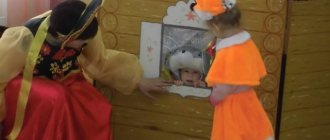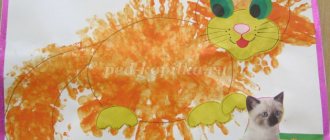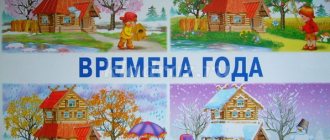Copyright
Step-by-step instructions on how to come up with a name for a children's theater studio using a real case as an example. Follow the algorithm and you will generate many interesting name options.
Preparatory stage
At the kick-off meeting we decided on what language the name should be in and what it should express. Don't ignore this step. Having correctly set the task, you can then compare the invented options with it and choose a favorite. For example, look at my brief - a list of questions that I ask a client who wants to order the development of a name from the Name is naming agency. Give yourself answers to these questions, it's really important.
The most important semes. A good name is at their intersection.
First stage: express analysis of competitors' names.
Using a search on the Internet (using Odessa resources) and in the electronic city directory, I received the following list of names:
I came across the fact that many theater studios are nameless; they operate at various children's centers, clubs, academies, and schools. Just in case, I recorded the names of these institutions, because if necessary, theater studios can use them for their identification.
The selection by search query randomly includes the Kyiv theater studios “ArtEko” and “Mkhatik”. I leave their names for analysis.
I also paid attention to the descriptors (clarifications, additions, descriptions) in the names. It turns out that theater studios and children's clubs are the most common, followed by centers and schools.
I started working by classifying names to understand which cluster was the most populated. I got the following groups:
Heroes of books, cartoons, corporate characters:
“Znayka”, “Willy-Winky”, “Chunga-Changa”, “Simba”, “Goldfish”, “Locomotive” (if you meant “Locomotive from Romashkovo”)
One of the tools used in the formation of names is diminutive forms:
“Merry Family”, “Balaganchik”, “Locomotive”, “Mkhatik”, “Domisolka”
Based on the analysis, it can be seen that the lexical cluster of theatrical terminology is practically empty, in contrast, for example, to the cluster with the names of cartoon characters and book heroes. I note this for myself as the most promising direction, because one of the requirements of the brief is that the name must be related to the theater.
There are very few studios whose names have a theatrical component
Second stage: drawing up a search map, delineating semantic fields.
I am identifying topics in which to search for a name for our theater and variety studio.
The outlined thematic blocks structure the search and guide the creative process.
Third stage: working out each part of the map.
At this stage, I filter out only obviously unsuitable options; I write down the rest according to the rules of brainstorming, without criticizing.
For example, this is the set of lexemes for the blocks “Theater Terminology” and “Theatrical Objects”
Source
Theater club program
In order to start working with children correctly, to attract their attention and interest in visiting the circle, it is necessary to gradually introduce them to the world of theater. Therefore, to begin with, you should pay attention to the following mandatory points:
- At the first lesson, it is necessary to introduce the child to the very concept of theater and its types. Explain how one genre differs from another.
- Step-by-step mastery of different types of creativity. It is necessary not only to play with children, but also to teach them how to use their voice; singing will help with this. Together with your students, come up with a hymn for your team, and start each lesson with it.
- The development of plastic surgery is aimed at liberating movements. Dancing and active games will help you achieve results.
- Improving artistic skills and abilities.
- Training in modeling the situation for a given task. For example, two guys are given the task of acting out a scene: a janitor swears at a woman for throwing a piece of paper. Explain to the children that it is necessary to get out of the current situation correctly, and so that the audience (the rest of the circle members) finds it interesting and funny. The main goal of the task is improvisation.
Thus, the work of the theater group will be aimed at education and upbringing. The first aspect is responsible for teaching the child artistry, and the second for discipline, completing assigned tasks, controlling emotions, developing intelligence and memory, socialization, and communication skills.
Small roles
- I like that it fully meets the original requirements. I like the subtext embedded in it.
- The name of the customer is not confirmed immediately. They interview relatives and friends, in particular mothers with children. Those express the point of view that such a name does not sell, that parents will not like it. Several days pass. They get used to the name, it takes root, they start using it. We decide to develop a logo and corporate identity, write texts for pages on social networks.
- It was a very easy and enjoyable project. Naming took place in one stage, which does not happen very often. I usually come up with names in two or three approaches, clarifying the wishes of customers and understanding them better after presenting the first options.
I'm wondering what you think of this title? How do you like it? Would you send your child to the Little Roles theater studio? Or perhaps you have your own favorite among the options offered? Write in the comments, I will be happy to discuss them.
The importance of additional education
Children attending the club acquire skills and abilities that help them study in secondary school. In addition, creative activities with a passionate, caring teacher make them more organized and manageable.
Fine motor skills, which develop well in such classes, make it possible to learn to write well and create beautiful handwriting. It is also known to be beneficial for children's mental performance.
The modern name of the arts and crafts club will attract the attention of children, they will be interested in going to it. In the process of creating a work of art, a little person will overcome difficulties: learn patience, learn about his capabilities.
The teacher will help you perform boring stages of work, such as a monotonous operation repeated many times, mechanically. Then your head is freed up for a conversation on an interesting topic. While the children are shading, gluing, cutting out something, the teacher is talking about a general topic.
Names suitable for the work program for preschoolers:
Theater clubs for children: skits, plays and lesson programs
It is desirable to develop children comprehensively from early childhood. In kindergarten, it is still difficult to identify the child’s talents that can be revealed. The clubs have one focus: computer science, mathematics, logic, sports. The exception is the theater group. The need for it in a preschool educational institution is obvious if we consider what abilities children develop after classes.
Features of working with high school students
The drama club at school should not be like serious lessons. Teenagers who attend classes are already tired of the complex curriculum, and there they are children to teachers. The leader of the circle should trust his actors more, listen to their opinions, and not work on the fact that the main leader here, and everything needs to be done as he said.
Ask the children to help select a piece to perform. Select several of the most interesting scenarios and vote together for the one you will stage on stage. It’s also worth involving the guys in the selection of musical accompaniment. Young people know better what their peers like. Such teamwork will unite the team even more, and each participant will be proud of their contribution to the performance.
It is worth paying attention to the fact that teenagers are impulsive; do not allow quarrels between them. Try to teach children to find alternative solutions that will suit everyone.
What can a theater club give a child?
A preschooler may at first not be interested in the additional activities offered - he does not know what it is. At a young age, children do not yet go to the theater, but can only watch puppet skits, where the acting is not visible. A conversation with parents or an introductory lesson that reveals the essence of the circle will help to arouse interest.
Theatrical art is capable of: revealing the inner potential of a child, helping him to relax, teaching him to communicate with peers, developing gestures and competent speech. Having tried to play in interesting images, the child will feel like a hero. He will develop a desire to play even more in the theater group in order to achieve success and surprise everyone.
Any child wants to be an object of admiration not only for his parents, but also for those around him. By showing his talent, he will increase his self-esteem and be more confident. Insularity and fear of peers will gradually disappear. There will be a disposition and desire for communication.
In addition, the circle participants will receive initial skills in development: musical, choreographic and psychological. They will learn to think creatively, train their memory and move towards achieving their goals.
What does a child receive as a result of attending a club?
Play activities, rehearsals and a lot of physical activity completely fulfill the child’s need for communication, movement, and an outburst of emotions. But this is not all that theater clubs can give to children. What else will the child receive?
- The ability to improvise in any, even the most difficult situation.
- The ability to fully control your body and feel the rhythm.
- Excellent speaking skills.
- The ability to reproduce any character and image.
- Ability to correctly compose a monologue and dialogue.
- Ability to resolve conflicts and get out of difficult situations.
- Teamwork skills.
- As a result of constant communication with children of different ages, performing on stage in front of spectators, the child will become more relaxed and will no longer be afraid of the public.
Teaching preschoolers in theater clubs
If parents notice their child’s ability to express thoughts interestingly, speak using facial expressions, or parody others, then they should boldly take him to a theater class.
Important! If this type of additional education is not available in kindergarten, you can consider a private option or inquire at local theaters about the availability of a club for younger children.
Private circles
Classes in private circles, more often called theater studios. They are led by experienced actors who are ready to share their experience with preschool children. The teacher focuses on the lesson plan, which he has drawn up for a certain age range, taking into account its psychological characteristics.
The purpose of the private circle is to prepare the children for the performance of the finished performance, which they will show to the audience from the stage. During intermediate classes, they get acquainted with the roles, rehearse them, and try to get used to the character for a brilliant performance. After the initial stage, the details of the image begin to be honed: work on speech and intonation, staging movements, working on facial expressions.
Important! This creates a lively and interesting image of the hero. They are the main aspects in acting for a successful performance.
An experienced actor will be able to interest a child in playing any genre in a private circle, even drama. He has in-depth knowledge of this creative process, which inspires trust and respect in his students. The leader also shows his acting skills, which arouses admiration among the guys. A positive example gives them a strong incentive to perform their role brilliantly. A private studio can make a child fall in love with the theatrical world.
Theater groups at theaters
It is no less interesting for children to attend classes in a theater club at existing theaters. Here they are also taught by real actors, whose performances the students can see in performances on a real stage. A drama club can be created at the theater, which will not yet stage plays for children based on the works of the classics, but will offer performances that are interesting to them.
Theater club at the theater
The spirit of the institution, under the sensitive work of teachers, helps the little actor’s creative potential to fully unfold. He works through each lesson with interest during rehearsal, repeating difficult moments two or three times. A big plus of the classes is that children perform roles on a real stage, which instills responsibility for the quality of the game.
Activities in kindergartens
For young children, kindergarten is a place of limitless creativity. Here they draw, play contact games, play sports, and learn poetry. During the working day, teachers from the theater club can visit them to help children express their individuality through theatrical performances. All children can attend trial classes, but those who are most interested will come to subsequent classes. They are already listening carefully to what role they will have to play in the work. At home, with their parents, they study the notes, where the words of the character being performed are written out.
Kindergarten actors
Even though the children are still small in kindergarten, it is not so easy to perform a theatrical performance with them. It is important for the leader to convey to their understanding what theater is and how to play the role. Even in a teenage club it is easier to teach - the energy reserves of children decrease with age.
Who should attend the club?
The children's theater group is suitable for everyone, without exception. For example, a child may not like music school, or he may not have the predisposition or talent for singing or playing musical instruments. The sports section may also be completely different from the area in which the child would like to develop. The theater club will appeal to almost everyone, regardless of age, hobbies and preferences.
For modest, repressed and inactive children, classes in a circle will liberate them, teach them to love themselves, and increase their self-esteem. Quiet children will learn to develop leadership skills.
Hyperactive children will find exactly the activity they need in a theater club. After all, they play there, run, sing, jump, roll on the floor, “walk on their heads,” “stand on their ears,” and do other useful things!
Hooligan children here will learn discipline, friendship, the ability to work in pairs and a large team, independently achieve their goals, commitment, and kindness.
Name for a theater club in kindergarten
A circle teaching theater arts cannot exist without a name. In kindergarten it has a certain meaning. In order for the name alone to arouse a child’s interest in attending classes, it must be as clear as possible to his mind and recognizable by ear. This could be a name that sounds like a children's TV show or a popular cartoon. As a rule, preschoolers watch children's channels on TV and understand their essence.
Trying on a role from TV will definitely interest them. The name for a theater club in kindergarten is something fun, catchy, interesting, without any signs of seriousness. For example, good options for how to name the group: “Grimasiki”, “Fixies”, “Tram-tam-tam”, “Wonderland”, “Fantasers”.





